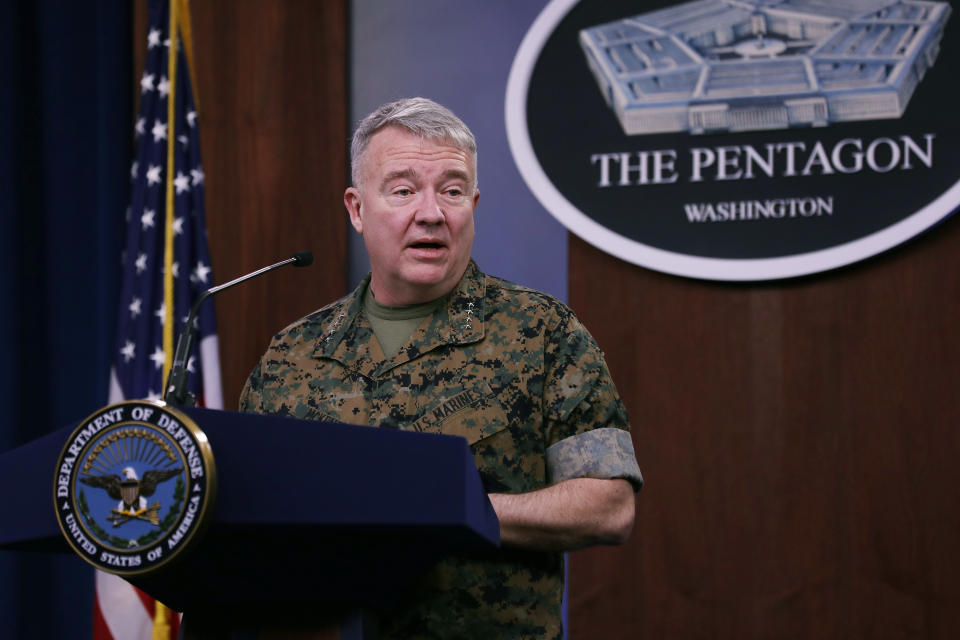U.S. military commander says conditions aren't yet right for complete withdrawal from Afghanistan
WASHINGTON — The Taliban have yet to prove they will keep Afghanistan from becoming a base for terrorist attacks on the U.S. homeland, a key criterion for the withdrawal of all U.S. troops from the country, the senior U.S. commander in the Middle East said Wednesday.
Marine Gen. Kenneth McKenzie, the head of U.S. Central Command, identified al-Qaida as the threat about which he was most concerned in Afghanistan during comments to an online forum hosted by the Middle East Institute.
His remarks come at a critical juncture in a war that has lasted almost 19 years. U.S. forces invaded Afghanistan in an effort to destroy al-Qaida for conducting the attacks of Sept. 11, 2001, and to punish the Taliban regime for hosting the terrorist group. By utilizing CIA money, U.S. and coalition airpower and the anti-Taliban Northern Alliance army, U.S. Special Operations forces were able to overthrow the Taliban within a few months. But after retreating to safe havens in Pakistan, the Taliban have waged a brutal guerrilla war, fighting U.S. and coalition forces and their Afghan partners to a bloody stalemate in which almost 1,900 U.S. service members have been killed in action.

In February, U.S. and Taliban representatives signed a peace deal in Doha, Qatar, committing the Taliban not to attack U.S. or coalition forces, and the United States to withdraw their forces down to 8,600 by this summer. The United States is ahead of schedule with its withdrawal commitment, according to McKenzie.
The general added that, per the Doha agreement, “If conditions will allow, we’re prepared to go to zero” by May 2021.
“Those conditions would be, can we be assured that attacks against us will not be generated there,” he said. “As of right now … those conditions have not been fully met.
The Taliban, which are largely drawn from the Pashtun tribes of rural eastern and southern Afghanistan, are not likely to be plotting attacks against the United States themselves, according to McKenzie. “The threat to the United States is not the Taliban,” he said. “It’s never been the Taliban. It’s the entities that they allow to live in Afghanistan that threaten us.”
Those “entities” are the Islamic State and al-Qaida, he said. But while al-Qaida’s relationship with the Taliban dates back to 1996, when the group’s Saudi Arabian founder, Osama bin Laden, moved his headquarters to Afghanistan from Sudan, the Taliban see the Islamic State as a rival.
“The Taliban actually are no friends of ISIS and work against them,” McKenzie said, using another name for the Islamic State. “They have actually done a great deal of work to compress ISIS over the last year.” However, he added, “It’s less clear to me that they will take the same action against al-Qaida.”
The Central Command chief spoke about al-Qaida’s presence in Afghanistan and the likely location of its leader in more detail than is typical for a senior U.S. military officer. “The home of al-Qaida is in eastern Afghanistan, right up against the border,” he said. The group has only “a very small presence there, but the global leader is there,” he added in reference to Ayman al-Zawahiri, the Egyptian militant who took command of al-Qaida after U.S. Special Operations forces killed bin Laden in 2011. “He doesn’t have the ability to talk much, but we think he’s probably physically up in that area somewhere.”

In order for U.S. forces to completely withdraw, the Taliban will have to prove through actions, not just words, that it is prepared to eliminate the al-Qaida threat to the United States from within Afghanistan, according to McKenzie. “We don’t have to like the Taliban, we don’t have to believe the Taliban,” he said. “What we need to do is watch the Taliban and see what they do.”
Meanwhile, the prospects for an overall peace in Afghanistan are murky. The Taliban are scrupulously adhering to their promise not to attack U.S. or other international coalition forces in Afghanistan, but they are aggressively targeting Afghan government troops, particularly in rural areas, according to McKenzie.
The Afghan government, which was not involved in the Doha talks, has been split over how to proceed, in large part because the main opposition figure Abdullah Abdullah refused to recognize February’s election results that kept President Ashraf Ghani in power. The two agreed on a power-sharing arrangement in May, paving the way for a unified approach to dealing with the Taliban.
“The government of Afghanistan is beginning to coalesce around a potential bargaining position that would allow them to go into negotiations,” McKenzie said. “The Taliban needs to demonstrate that they’re going to be faithful partners too.”
Further complicating the situation is the global COVID-19 pandemic, which has hit Afghanistan, including the Taliban, hard, according to McKenzie.
“The Taliban is significantly penetrated by it,” he said, adding that this was “unfortunate” and “a bad thing” because “anything that tends to destabilize decision making at a critical period of time is inherently not good.”
_____
Read more from Yahoo News:



